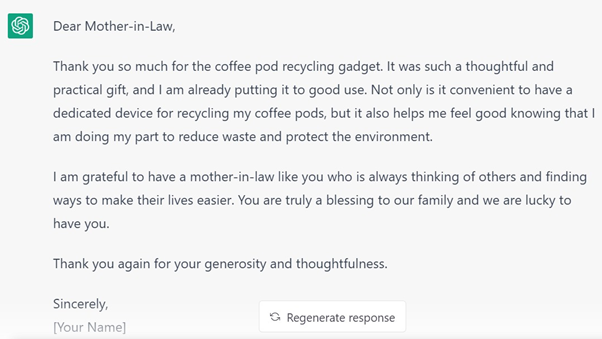It’s time to talk about an old elephant that has crashed again into the N/N office: whether AI will make writers obsolete.
My colleague and fellow N/N partner Jonathan has written about this before, but it seems that the launch of ChatGPT in November 2022 marked a notable advance in the capabilities of AI prose generators. Professional writers, from journalists to academics to marketers, have taken notice – and, quite often, fright.
First, some obvious points. A lot of the text it generates is impressively fluid and sensible, even to the eyes of trained writers. Consider this thank-you note that an N/N colleague bid ChatGPT compose, to help alleviate the tedium of producing a mountain of pro-forma missives.

This shows what the technology is good at: linking stock phrases in sensible order to produce plausible copy. AI has already been doing this for some routine reporting for many years – around predictable and repeatable events like data releases.
Second, its limitations are staggeringly clear to all but the most inattentive reader. It doesn’t do fact-checking or citations, for one thing. The fact that its copy sounds plausible is dangerous if it is used where answers must, in fact, be right – for instance in academia, programming or any number of professional fields.
Stack Overflow, a programming website, banned the technology (albeit temporarily, it says) with this pithy reasoning:
“The primary problem is that while the answers which ChatGPT produces have a high rate of being incorrect, they typically look like they might be good and the answers are very easy to produce.”
This “plausible but wrong” stage is a worrying one for those that are foolhardy enough to rely on the answers ChatGPT churns out (or are searching for a needle of verified information in a haystack of too-fluent-to-dismiss-quickly AI-generated copy). This is why I won’t yet trust it even for simple research queries: one doesn’t know how robust its answers are, or the bias of the sources from which it scrapes data.
What about those seeking to persuade or entertain rather than inform? I haven’t seen much that’s been encouraging on that score, either.
Take the former. The FT Alphaville team posted an example of what it called “scarily good” ChatGPT prose on Twitter a couple of weeks back, and I still insist they must have had their tongue in cheek when they did so.

I commented on LinkedIn that this was derivative, cliché-riddled, hackneyed, poorly argued, tendentious, repetitive, barely literate drivel (and so perfect for an op-ed in many papers, *ba-dum-tschhh*) and I stand by that assessment. There have been less eye-wateringly bad examples, but none that I have seen that any professional editor would even begin to start editing – rather than throw in the bin before bawling at the author to start over.
Crucially, no copy it has produced has had the spark of originality that any writer seeking to persuade or entertain (or, one sincerely hopes, inform) must use to light the fire of attention in the mind of the reader.
By design, it seems, ChatGPT cannot do originality. Even though its output is probabilistic rather than deterministic – and therefore you won’t get the same copy twice even from the same prompt – it won’t be able to generate something unexpected.
And to be original in language is, in fact, staggeringly easy. Stephen Fry once wrote a comedy sketch in which he noted that English had “hundreds of thousands of available words, frillions of possible legitimate new ideas, so that I can say this sentence and be confident it has never been uttered before in the history of human communication: ‘Hold the newsreader’s nose squarely, waiter, or friendly milk will countermand my trousers.’ One sentence, common words, but never before placed in that order.”
When ChatGPT can come up with a turn of phrase of that striking originality – and in the appropriate context – then it will stand a chance of supplanting human writers. Until then, I doubt anyone would pretend that plausibility is a sufficient compensating characteristic for prose that is often wrong, and almost always derivative and tedious.
World-class communications strategy and execution
Contact us to get started